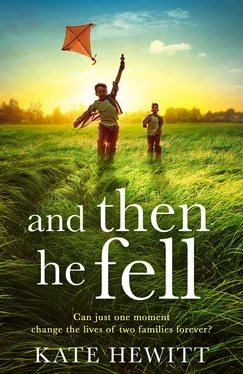1 ...8 9 10 12 13 14 ...17 The new nurse on duty informs me that Ben is now stable enough for him to be transferred to the neurology department. I wait for an hour before they are finally ready to transfer him; I watch with my heart in my mouth as two orderlies carefully move his supine body from the bed to the stretcher. Machines attached to him beep and shriek and I resist the impulse to cover my ears with my hands.
I follow them up to the neurology department, which is an oasis of calm compared to the ER. There are no sirens or screams, no weeping or groans. Every patient has a private room and the nurses and doctors seem both focused and friendly. The knot of tension that has resided between my shoulder blades since I first got that phone call loosens ever so slightly.
Now that Ben is in the neurology department, he has a new doctor, a brain injury specialist, Nadine Velas. She introduces herself to me as soon as Ben is settled, taking me to her private office and pouring me a Dixie cup of water which I sip awkwardly.
“So, Ms. Reese.” She scans Ben’s file. “May I call you Madeleine?”
“Maddie,” I say, and she looks up and smiles.
“Maddie. I know things have been moving very fast for you, and you’ve probably had a ton of information thrown at you. So I’m here to ask you if you want to ask me any questions.” She smiles again and waits, her hands folded on her desk. She is a pretty, vibrant woman in her mid-forties; I can see a bright pink top underneath her white lab coat. I instinctively like her, more than the stern-faced doctor down in the ER.
I have about a million questions to ask her, but I manage just one. “When do you think Ben will wake up?”
“I can’t answer that for certain,” she tells me. “But if he remains stable through the next few days, we’ll start considering reducing the medication that is keeping him in a comatose state. For better or worse, the brain is a tricky thing. There is no predicting how it, and how Ben, will react to the lowered dosage. So if his body resists and he experiences another storming episode…” She waits, eyebrows raised, to check if I know the lingo, and I nod. “Then we’ll have to proceed very carefully. But for now I’d say we’ll start considering when to wake him up in the next forty-eight hours.”
I nod, suddenly overwhelmed because yesterday Dr. Stein was telling me the next twenty-four to forty-eight hours would be critical to Ben’s survival. Now Dr. Velas isn’t talking about if he survives, but when he wakes up. This is progress.
“I also should say at this point that there are no guarantees about what Ben’s capabilities will be when he does come out of the coma,” Dr. Velas continues, her tone one of quiet warning. My relief lasted all of two seconds. “It’s impossible to tell how badly his brain has been injured, or what faculties will be affected.” She pauses to check I’ve digested this, and I manage another nod, this one jerky. “His movements might be limited, or his speech or his memory, or all three. I simply cannot say at this stage.”
“Can’t you…can’t you tell from the CT scan he had when he first came to the ER?” I ask.
“We can tell what kind of injury he has,” Dr. Velas agrees, “and in this case, we know he has a contusion on the left temporal lobe. How that manifests itself when he is conscious, we’ll just have to see.”
“But the contusion…” I stumble slightly over the word, “will heal, won’t it? Isn’t it just like a…like a bruise?”
“Yes,” Dr. Velas says gently, “a bruise on the brain. There will still almost certainly be existing and pervasive brain damage.”
The words together jar me; they are what I haven’t wanted to face. Brain damage. I don’t want to associate them with Ben, with my son, with my life. And yet Dr. Velas spoke them with an awful, quiet certainty.
I spend the rest of the day alternating between the waiting room, the hospital’s restaurant, and Ben’s room. I sit by his bed and study his face, his rounded cheeks, his sandy brown hair, the freckles dusted across his nose.
Sitting there in the quiet solitude, the only sound the steady beep of the machines that surround him, measuring all the vital signs I don’t really understand, I let my mind wander through the last nine and a half years of Ben’s life. I search for good memories, and I am ashamed at how few of them there actually are. So much of my life with Ben has been a weary struggle through a blur of days: the exhaustion of his infancy, the endless tantrums of his toddlerhood, and then off to school where I was always wrestling and negotiating and ultimately relenting. Summers and holidays have been a maze of patched-together childcare; as an Alwin employee I get seventeen days of vacation a year. Ben has three months of summer vacation. None of this has been easy.
But there are moments I remember, moments I hang on to now. Ben taking his first steps, toddling across the living room while I wait with my arms outstretched, his incredulous, beaming grin branding my heart. A vacation we took when he was five and he still liked to snuggle, at least a little bit; hugging Ben has always been like trying to hold on to a fish. That summer we rented a tiny cottage on Fire Island for a week and played on the beach all day long, read stories at night. I felt like a real mother, like the kind of mother I’d wanted growing up, the kind of mother I wanted to be to Ben if I could only figure out how. If I could only be strong enough.
Then I let myself think of more recent memories, of afternoons in Central Park with Lewis and Josh. In September Lewis brought kites he’d made himself and we flew them in the Sheep Meadow, laughing, our heads tilted towards the bright blue sky. Movies at Lincoln Center, bowling downtown, a trip to the working farm in Queens. In the last two years the four of us have spent a lot of time together. Happy times; the memories are infused with a golden light, like a movie montage.
We were almost like a family. The family I’ve never had. At least, it felt that way to me, and I think it did to Ben too. Over the last year he’d started asking about his dad, wanting to know details, and of course I couldn’t give him any. But I could give him time with Lewis. That felt important, necessary, even as I recognized it couldn’t possibly have been as important or necessary to Lewis as it was to us.
I was the one embroidering daydreams, letting myself pretend it all meant more than it did. Lewis was just hanging out with his kid and his kid’s friend. I know this, of course I know this, but it still sits like a leaden weight inside me.
Juliet texts me at lunchtime: Thinking of you xo which makes me grit my teeth. That’s it? One lousy text? I don’t reply.
By two o’clock in the afternoon Ben’s condition is neither worse nor better, which frustrates me. I want Ben to wake up and smile at me and ask for his soccer ball. I want someone to talk to; the loneliness, a loneliness I’ve dealt with my whole life, is starting to make me feel crazy.
I was raised in foster homes since I was four years old, so I know a lot about loneliness. My parents divorced when I was a baby, and my father walked out without, as far as I know, a backward glance. I certainly never saw him again. My mother spiraled down into depression, according to the files I accessed when I was eighteen, and when I was four I was removed from her care for ‘gross neglect’. Apparently I only weighed twenty-eight pounds, so she must have forgotten to feed me. I don’t remember any of it, not even a few blurred snatches of memory. It’s as if a curtain has been drawn across the first four years of my life. I do remember monitored visits with my mother over the next few years, as the social services sought to find a way to get us back together. I remember sitting on a hard plastic chair while a woman across from me, a woman who still has a blurred face, talked and sometimes cried quietly. I remember wanting to leave, fidgeting because I needed to pee, feeling uncomfortable and impatient and confused.
Читать дальше












